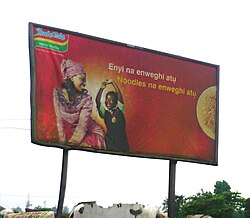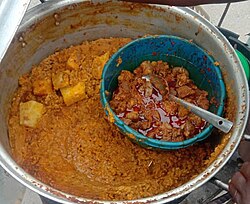Wiki Loves Living Heritage/Intangible Cultural Heritage of Nigeria
This list is generated from data in Wikidata and is periodically updated by a bot.
Edits made within the list area will be removed on the next update!
Argungu Fishing Festival
midwifery
Ijele Masquerade
Sango Festival of Oyo

Kwagh-Hir
African Rosewood plant
roselle juice
Yoruba
Yam porridge
fufu
Wheat and ewedu soup
Ɗanwake
Unripe Plantain Porridge
Breadfruit Porridge
Tuwon dawa
Tuwo masara (corn meal)
Tuwon shinkafa
Egusi soup
Sika Wɔ Ntaban
Sesame soup
Edo black soup
Bole
rice and stew with cowskin
Efo riro
pounded yam
Slamming soup
Concoction rice
Echicha
Ukpo Ogede
Peppered snail
peanut milk
palm nut soup
Urhobo Owho Soup
Owo soup
Bitter leaf soup
okra soup
Okra Soup
Bambara groundnut
Bambara beans pudding
OKOHO
Okazi soup
Ofe Oha
ogbono soup
Ofada rice
Adamma Dance
Spicy cow foot
Nigerian Pidgin
Margi special
Achi Soup
Abacha Ugba
moin moin|moi-moi
Apapa ( Beans Loaf )
miyar kuka
Kunun gyada
Meat peppersoup
Kuli-kuli
kilishi
jollof rice
Isi ewu
isi ewu
Igbo
Miyan Geda
Eba
fura
Fura da nono (millet and milk)
Potato fufu
Groundnut soup
Finger millet pap
Ewedu soup
Ekuru
Ekpang Nkwukwo
Egbo
Edikang Ikong
Abak atama soup
Banga rice
akassa
Dambe
dambun shinkafa
dambu
Chapman
Achicha Ede
Catfish pepper soup
coconut candy
Boli
Garri
beans and corn porridge
Kunu
Banga Rice
Igbo Traditional Wrestling (Mgba)
Gbegiri Soup
Amala(yam flour)
Abula
Alake of Egba
ogi
Sinasir
agidi
Ewa Agoyin
Akwete cloth
Eba
Nsala soup
Afia Efere
Afang
adire
akara
African salad
Bobozee


Nigerian hip hop


Waka


Ibadan School

Ida


Nigerian English

Sakara music

Were music

waka music

Inouwa

Igbo rap

Pate acha

indigenous Nigerian music

Orijin

Atama soup

Editan

Nigerian country

waina

Ife Heads

Kayaali

Nkpokiti

Ewi

bambara nut pudding

Peeled Beans Porridge

Kunu aya

gizdodo

Ofe Oha

Oil Bean Soup

Ofe Owerri

African breadfruit

miyan zogale

Yaji spice

concoction rice

swehi

Idé wéré wéré

Pawpaw soup

plantain mosa

Ebiripo

Groundnut milk/Peanut milk

Tiger nut drink

Ọkanga Masquerade Dance

Ogbongelege Dance


Hausa

Chadian Arabic
How can I contribute?
Report a problem
If you spot a mistake, but you need help to make the correction, you can leave a note on the discussion page.
Upload an image about a tradition!
Click on any of the upload buttons to upload a new image of that heritage element to Wikimedia Commons.
There are different contests in Wikimedia projects around the year. The upload button will sign your image up to the currently ongoing contest.
Find missing images
Find an image on Wikimedia Commons by clicking on the Commons category link. You can alternatively search for an image by the element title using the search link.
Correct data
To correct data of a heritage element, you can follow the Wikidata link on the element. You can translate names and descriptions to your language, for example.
To add a new image to the element item, add a statement image (P18). Add the filename of the image to the statement.
Edit or translate many elements
Use these lists to translate and add information to the elements.
The simple list can be used to add labels, descriptions, and aliases in several languages as well as images.
The extended list allows you to add and edit more details, such as the type of heritage or geographic information. For the extended information, you need to provide source references. Read more in the article How to import an inventory.
In both cases, you need to log in with your Wikimedia account to make changes.
Are some traditions missing altogether?
To add any living heritage element to this project, add WikiProject Intangible Cultural Heritage (Q112898263) to the on focus list of Wikimedia project (P5008) property in Wikidata. Make sure to add either country of origin (P495) or country (P17) to it, and additional statements about culture (P2596) or indigenous to (P2341).
Join the data team to batch import items in the inventories.
The designations employed in the texts displayed on the Wiki Loves Living Heritage page do not imply the expression of any opinion whatsoever on the part of UNESCO concerning a) the legal status of any country, territory, city or area, b) the legal status of its authorities or c) the delimitation of its frontiers or boundaries.













































































































